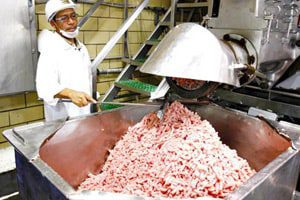
Research has revealed that common foodborne bacteria may be involved with multiple sclerosis, which is a degenerative central nervous system disease. At a recent American Society of Microbiology’s 2014 ASM Biodefense and Emerging Diseases Research Meeting, researchers from the Weill Cornell Medical College in New York announced that a toxin produced on raw meat and […]
 Research has revealed that common foodborne bacteria may be involved with multiple sclerosis, which is a degenerative central nervous system disease.
Research has revealed that common foodborne bacteria may be involved with multiple sclerosis, which is a degenerative central nervous system disease.
At a recent American Society of Microbiology’s 2014 ASM Biodefense and Emerging Diseases Research Meeting, researchers from the Weill Cornell Medical College in New York announced that a toxin produced on raw meat and poultry by the Clostridium perfringens (C. perfringens) bacterium, acts on the same type of cells as multiple sclerosis (MS), according to The New York Daily News. “What we’ve shown is the toxins target the cells that are targeted in MS,” researcher Jennifer Linden told NBC News.
MS targets the central nervous system by destroying nerve fibers and myelin, which is the fatty protective sheath that encases nerve fibers. When myelin and nerve fibers are broken down, the brain and spinal cord are signaled and react by producing dizziness, pain, numbness, paralysis, and loss of vision, The NY Daily News wrote.
MS affects some 400,000 Americans and is believed to originate from a genetic and environmental triggers; however, researchers remain unclear as to the nature of those triggers, according to The NY Daily News.
One of the 12 protein toxins produced by C. perfringens, known as the epsilon toxin, also attack myelin and kills the cells that produce myelin in the brain, Linden told NBC News, according to The NY Daily News. C. perfringens also targets other cells involved in inflammation in MS, according to The Huffington Post, including the meningeal and retinal vascular cells.
This particular finding “was exciting because it provides a possible explanation for meningeal inflammation and subpial cortical lesions exclusively observed in MS patients, but not fully understood,” study researcher Jennifer Linden said in a statement, The Huffington Post reported.
Not all strains of C. perfringens produce the epsilon toxin, type B, and the strains that do not, are the culprit in nearly one million cases of food poisoning annually, according to The Huffington Post. Researchers tested 37 local food samples and found that 13.5 percent were positive for C. perfringens and 2.7 percent were positive for a strain of C. perfringens that produced the epsilon toxin, The Huffington Post wrote.
Linden’s team found the epsilon-producing strain in a 21-year-old woman diagnosed with MS, according to The NY Daily News. Should additional research confirm that the epsilon toxin is an MS trigger, said Linden in a statement, an antibody or vaccine may be developed to neutralize the toxin.
The study doesn’t prove MS is caused by the toxin; however, Bruce F. Bebo, associate vice president of discovery research for the National Multiple Sclerosis Society, told NBC News that “to me, if you were going to design a trigger for this disease, this would really fit the mold really well,” according to The Huffington Post.
Because the findings have not yet been published in a peer-reviewed journal, they are regarded as preliminary.


